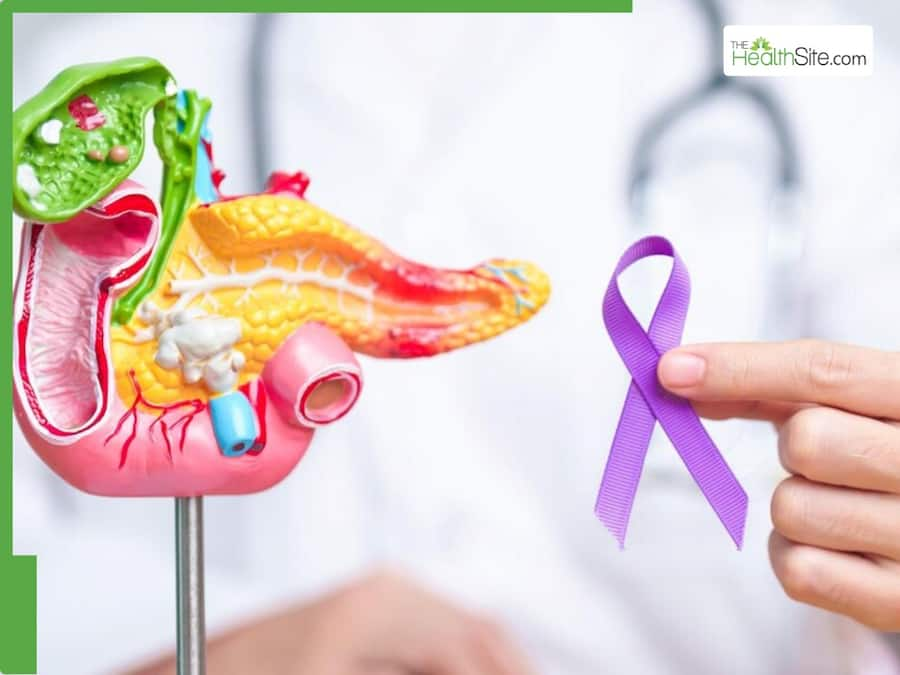Pancreatic cancer awareness: Prevent this cancer from forming in the body by eating nutritious foods like green leafy vegetables, seafoods, salads, and being regular with exercises.

Written by Prerna Mittra |Updated : February 4, 2025 3:01 PM IST
Lifestyle habits and pancreatic cancer risk: It is no secret that good health is a direct result of leading a healthy lifestyle and making good and conscious choices about diet, sleep, and exercise on a regular basis. Sometimes, however, owing to the demands of a job and the general pressures of life, one ends up not following a disciplined routine, which can harm their health in the long run, unless proactive measures are implemented immediately. Pancreatic cancer, for instance, is a leading form of cancer, not just in India, but around the world. It is understood to originate as a growth of cells in the organ lying behind the lower part of the stomach, which is the pancreas. The pancreas secretes enzymes that aid in digestion, and produces hormones like insulin to help regulate the metabolism of sugar. Doctors say that pancreatic cancer is often detected late as there are no symptoms in its early stages. It spreads rapidly, and has a poor prognosis. Pancreatic ductal adenocarcinoma (PDAC) is the most common and severe type of pancreatic cancer.
Symptoms Of Pancreatic Cancer
According to Dr Ronak Tate, consultant-gastroenterology at Fortis Hiranandani Hospital, Vashi, in its late stages, pancreatic cancer starts to exhibit symptoms like:
- Loss of appetite;
- Weight loss;
- Abdominal pain that radiates to the back;
- Jaundice;
- Onset of diabetes
“These are common symptoms that may be indicative of non-cancerous health issues, and thus, are harder to diagnose. Smoking, alcohol, obesity, chronic pancreatitis and diabetes are risk factors that can cause pancreatic cancer if left unchecked and untreated,” the doctor explains.

Changes In The Gut Microbiome And Cancer Risk
Dr Tate says that changes in the gut microbiome — the countless tiny microorganisms who live in the digestive tract — can affect the development and progression of pancreatic cancer.
“Research has shown that the Western diet — which is too high in carbohydrates and fats, and lacking in protein — upsets the constitution of the gut microbiome. If the microbiome consists of certain types of harmful bacteria, it can start producing ‘carcinogens’ that damage the pancreatic cells, raising the risk of possible cancerous mutations in the future. Altered state of the gut microbiome can also lead to chronic inflammation that damages the tissues of the pancreatic cells. The gut microbiome can also impact the body’s immune system, leading to weakened immune responses. This allows for an unchecked growth of cancerous cells,” he explains.
Pancreatic Cancer Survival Rate
The doctor continues by saying that in the last decade, researchers have made great leaps in working towards a possible ‘cure’ for PDAC, but the survival rate at advanced stages remains ‘abysmal’. “Prevention remains the best possible way to ward off pancreatic cancer. Regular exercise, incorporate low-glycemic foods (such as whole grains, leafy green vegetables, and lean proteins along with salads, olive oil, fish and seafood, fruits and nuts) into your daily diet, as most of these foods are anti-inflammatory in nature. One should also refrain from consuming alcohol excessively and smoking, as doing so can help prevent pancreatic cancer from manifesting,” Dr Tate concludes.



















